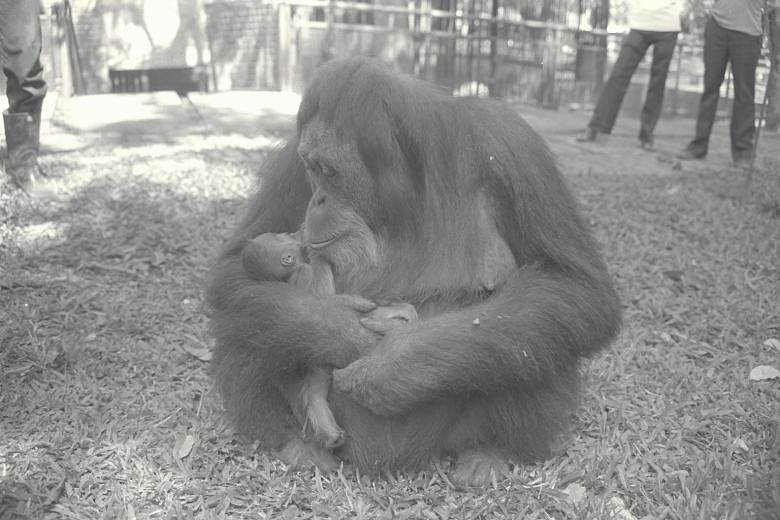Ah Meng is giving orang utans a good name as a role model - and Singaporeans generally have a healthy attitude about this group of apes.
French student Miss Isabelle Gilloux said this despite experiencing the wilder side of the normally placid primate last year. Miss Gilloux, 23, who is doing a doctorate on orang utan behaviour, was chased out of Ah Meng's territory when she became jealous of the attention that her keeper was paying to Miss Gilloux.
On another occasion, the primate cornered her in a kitchen near the orang utan enclosure. She had to use chairs and tables to kick up a racket to ward off the animal.
She has since realised that she angered Ah Meng by intruding into her territory.
Said the University of London student: "Ah Meng is popular because she is like a member of the family. She shows that animals are not necessarily temperamental, nasty, dirty or smelly."
She spoke to The Straits Times at the Mandarin Hotel where she presented a talk yesterday about her experience in rehabilitation centres for orang utans found in Kalimantan and Sabah.
In these centres, staff help displaced or abandoned orang utans learn survival skills to help survive in the wild.
Miss Gilloux might have spent about a year now studying the behaviour of orang utans but she quickly dismissed any idea that she wants to be another Dian Fossey, the naturalist who devoted her life to the study of gorillas; and the protagonist in the movie Gorillas in the Mist.
Miss Gilloux had actually lived in Africa, including Rwanda - where Dian Fossey studied the gorillas - from seven to 14.
But she said: "I cannot devote my life to just one animal. I would like to specialise in big land animals like elephants, big cats, hippos and others in future."
Miss Gilloux leaves today to study a new orang utan group in Malaysia's Zoo Negara but she will remember her experience in the Singapore Zoo.
She found the orang utan colony here well taken care of. "Captivity will always be an artificial environment.
What better facility can you give them than such a big enclosure. I think the orang utans are very happy. They have enough space if they want to isolate themselves from each other and there is enough space for them to play in."

